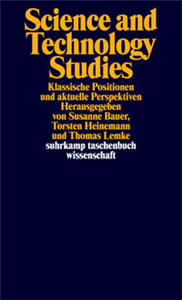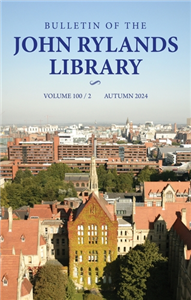Your Search Results
-
Presses de Sciences Po
Sciences Po University Press has a triple vocation: to publish research, to edit reference work for students, and to stimulate public and political debate. Founded in the 1950s by Sciences Po (Political Studies Institute of Paris), it has established itself as a leading university publisher. With more than 1,000 titles in its catalogue, Sciences Po University Press publishes the most advanced research in its areas of expertise: geopolitics, globalization and governance, trends in political life, societal change, gender theory and development and 20th century history.
View Rights Portal
-
Promoted ContentThe ArtsSeptember 2020
Science in performance
Theatre and the politics of engagement
by Simon Parry
This electronic version has been made available under a Creative Commons (BY-NC-ND) open access license. This book is about science in theatre and performance. It explores how theatre and performance engage with emerging scientific themes from artificial intelligence to genetics and climate change. The book covers a wide range of performance forms from Broadway musicals to educational theatre, from Somali drama to grime videos. It features work by pioneering companies including Gob Squad, Headlong Theatre and Theatre of Debate as well as offering fresh analysis of global blockbusters such as Wicked and Urinetown. The book offers detailed description and analysis of theatre and performance practices as well as broader commentary on the politics of theatre as public engagement with science. Science in performance is essential reading for researchers, students and practitioners working between science and the arts within fields such as theatre and performance studies, science communication, interdisciplinary arts and health humanities.
-
Promoted ContentScience & MathematicsSeptember 2024
The elephant and the dragon in contemporary life sciences
A call for decolonising global governance
by Joy Y. Zhang, Saheli Datta Burton
This book provides a powerful diagnosis of why the global governance of science struggles in the face of emerging powers. Through unpacking critical events in China and India over the past twenty years, it demonstrates that the 'subversiveness' assumed in the two countries' rise in the life sciences reflects many of the regulatory challenges that are shared worldwide. It points to a decolonial imperative for science governance to be responsive and effective in a cosmopolitan world. By highlighting epistemic injustice within contemporary science, the book extends theories of decolonisation.
-
 Trusted Partner
April 2017
Trusted Partner
April 2017Science and Technology Studies
Klassische Positionen und aktuelle Perspektiven
by Susanne Bauer, Torsten Heinemann, Thomas Lemke
In den vergangenen Jahrzehnten ist mit den Science and Technology Studies (STS) ein Forschungsfeld entstanden, das eine grundlegende Neubestimmung des Verhältnisses von Wissenschaft, Technik und Gesellschaft vornimmt. Der vorliegende Band versammelt erstmals zentrale Texte der STS in deutscher Sprache, u. a. von Bruno Latour, David Bloor, Michel Callon, Donna Harraway oder Karen Barad, und bietet zudem Überblicksdarstellungen aller wichtigen Forschungsgebiete und Theoriepositionen. Entstanden ist so eine grundlegende Einführung in diese innovative Forschungsrichtung, die darüber hinaus auch eine Zwischenbilanz der Entwicklung der STS zieht und aktuelle Herausforderungen und Debatten auslotet.
-
 Trusted Partner
May 2021
Trusted Partner
May 2021The Humane Idea
Rudolf Virchow and Hermann von Helmholtz. The legacy of the Charité
by Ernst Peter Fischer, Detlev Ganten
Two of today’s leading scientists, Ernst Peter Fischer and Detlev Ganten, reconfirm the legacy of two influential 19th-century researchers. To mark the 200th birthday of Rudolf Virchow (1821–1902) and Hermann von Helmholtz (1821–1894), they explain why pioneering research and holistic thinking are still relevant for health science and practice, and for a sustainable balance of people, society and the environment. The historical achievement of Virchow and Helmholtz continues today with the work of researchers like Emmanuelle Charpentier and Christian Drosten, so ensuring that the humane idea continues to be fruitful in the future. An insight into the history of medical science.
-
 Trusted Partner
The ArtsSeptember 2020
Trusted Partner
The ArtsSeptember 2020Science in performance
by Maggie B. Gale, Maria M. Delgado, Peter Lichtenfels, Simon Parry
-
 Trusted Partner
Humanities & Social SciencesJanuary 2024
Trusted Partner
Humanities & Social SciencesJanuary 2024Dog politics
Species stories and the animal sciences
by Mariam Motamedi Fraser
Do dogs belong with humans? Scientific accounts of dogs' 'species story,' in which contemporary dog-human relations are naturalised with reference to dogs' evolutionary becoming, suggest that they do. Dog politics dissects this story. This book offers a rich empirical analysis and critique of the development and consolidation of dogs' species story in science, asking what evidence exists to support it, and what practical consequences, for dogs, follow from it. It explores how this story is woven into broader scientific shifts in understandings of species, animals, and animal behaviours, and how such shifts were informed by and informed transformative political events, including slavery and colonialism, the Second World War and its aftermath, and the emergence of anti-racist movements in the twentieth and twenty-first centuries. The book pays particular attention to how species-thinking bears on 'race,' racism, and individuals.
-
 Trusted Partner
Humanities & Social SciencesDecember 2024
Trusted Partner
Humanities & Social SciencesDecember 2024Bulletin of the John Rylands Library 100/2
Higher Learning and Civic Cultures of Knowledge: Manchester 1824–2024
by Stuart Jones
The John Rylands Library houses one of the finest collections of rare books, manuscripts and archives in the world. The collections span five millennia, have a global reach and cover a wide range of subjects, including art and archaeology; economic, social, political, religious and military history; literature, drama and music; science and medicine; theology and philosophy; travel and exploration. For over a century, the Bulletin of the John Rylands Library has published research that complements the Library's special collections.
-
 Trusted Partner
July 2021
Trusted Partner
July 2021My Life with Viruses
A researcher’s history of the fascinating world of pathogens
by Ernst-Ludwig Winnacker in association with Jeanne Rubner
In times of the coronavirus pandemic many people have certainly condemned them, but Professor Ernst-Ludwig Winnacker has dedicated his life to researching them and is intrigued by viruses – even if sometimes he is keenly aware of their fatal effects. To mark his 80th birthday the biochemist describes the co-evolution and co-existence as well as the eternal ‘battle’ between humans and viruses. Winnacker takes up the cause of these ‘biological elements between animate and inanimate nature’ because they play an important role in fundamental research and genetic technology, and without them human beings would not be what they are.
-
 Trusted Partner
July 1995
Trusted Partner
July 1995Der Glasmensch und andere Science-fiction-Geschichten
by Marcus Hammerschmitt, Franz Rottensteiner, Marcus Hammerschmitt
Marcus Hammerschmitt schreibt Science-fiction-Erzählungen, die technologische Phantasie, psychologische Einsicht, Lust am gedanklichen Experiment und poetische Erfindungskraft vereinen. Wie Herbert W. Franke oder Peter Schattschneider basiert er seine Geschichten auf einer soliden Grundlage, entwickelt seine Szenarios und Fabeln spielerisch, verknüpft sie aber dramatisch mit den größeren Problemen von Ökologie einerseits und den Zweifeln und inneren Konflikten des einzelnen andererseits.
-
 Trusted Partner
Trusted Partner
-
 Trusted Partner
February 1976
Trusted Partner
February 1976Die Jagd
Neue Geschichten des Piloten Pirx
by Stanisław Lem, Roswitha Buschmann, Kurt Kelm, Barbara Sparing
Stanisław Lem wurde am 12. September 1921 in Lwów (Lemberg) geboren, lebte zuletzt in Krakau, wo er am 27. März 2006 starb. Er studierte von 1939 bis 1941 Medizin. Während des Zweiten Weltkrieges musste er sein Studium unterbrechen und arbeitete als Automechaniker. Von 1945 bis 1948 setze er sein Medizinstudium fort, nach dem Absolutorium erwarb Lem jedoch nicht den Doktorgrad und übte den Arztberuf nicht aus. Er übersetzte Fachliteratur aus dem Russischen und ab den fünfziger Jahren arbeitete Lem als freier Schriftsteller in Krákow. Er wandte sich früh dem Genre Science-fiction zu, schrieb aber auch gewichtige theoretische Abhandlungen und Essays zu Kybernetik, Literaturtheorie und Futurologie. Stanisław Lem zählt heute zu den erfolgreichsten Autoren Polens. Sein Werk wurde vielfach ausgezeichnet, verfilmt und in 57 Sprachen übersetzt.
-
 Trusted Partner
Trusted Partner
-
 Trusted Partner
Trusted Partner
-
 Trusted Partner
Trusted Partner
Wissenschaft ist das, was auch dann gilt, wenn man nicht dran glaubt
Das große Jubelbuch der Science Busters
by Science Busters
-
 Trusted Partner
Trusted Partner
-
 Trusted Partner
Trusted Partner
-
 Trusted Partner
Humanities & Social SciencesFebruary 2018
Trusted Partner
Humanities & Social SciencesFebruary 2018Popular science and public opinion in eighteenth-century France
by Michael Lynn, Joseph Bergin, Penny Roberts, Bill Naphy
In this book, Michael R. Lynn analyses the popularisation of science in Enlightenment France. He examines the content of popular science, the methods of dissemination, the status of the popularisers and the audience, and the settings for dissemination and appropriation. Lynn introduces individuals like Jean-Antoine Nollet, who made a career out of applying electric shocks to people, and Perrin, who used his talented dog to lure customers to his physics show. He also examines scientifically oriented clubs like Jean-François Pilâtre de Rozier's Musée de Monsieur which provided locations for people interested in science. Phenomena such as divining rods, used to find water and ores as well as to solve crimes; and balloons, the most spectacular of all types of popular science, demonstrate how people made use of their new knowledge. Lynn's study provides a clearer understanding of the role played by science in the Republic of Letters and the participation of the general population in the formation of public opinion on scientific matters.
-
 Trusted Partner
Trusted Partner
-
 Trusted Partner
Trusted Partner
-
 Trusted Partner
Trusted Partner























